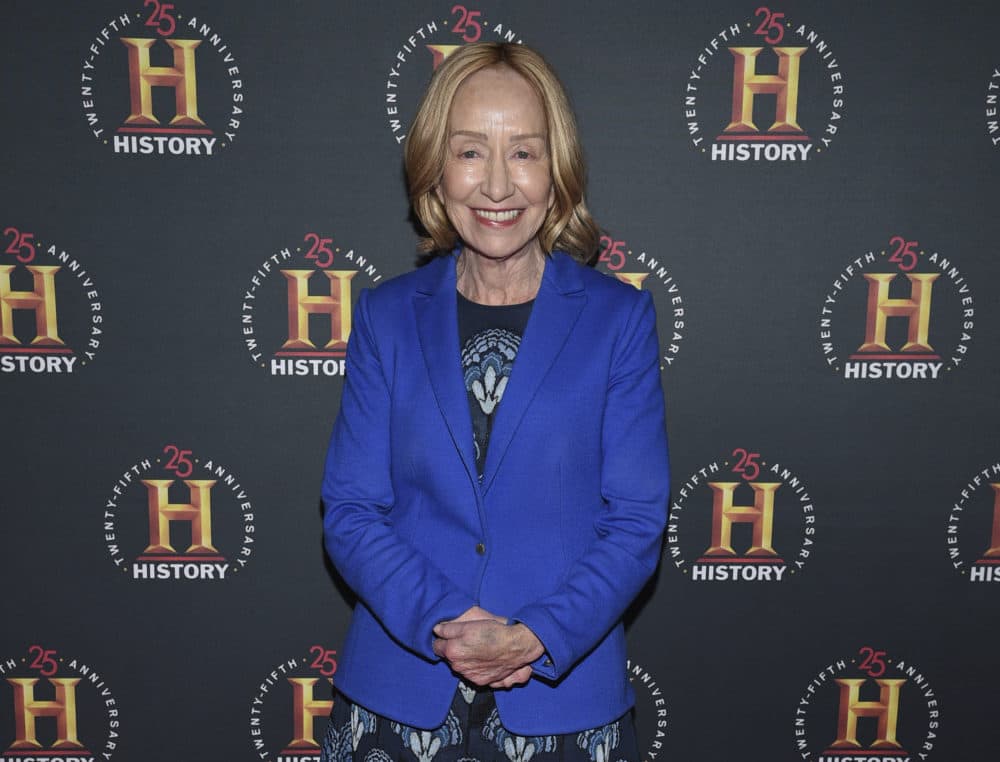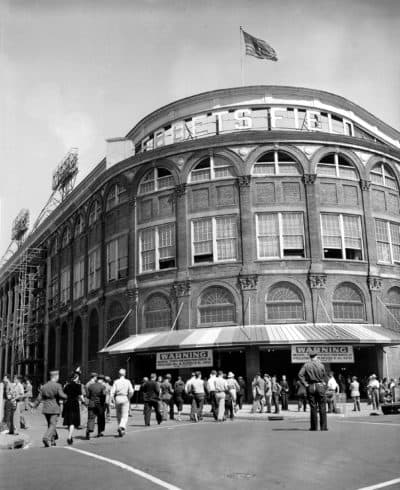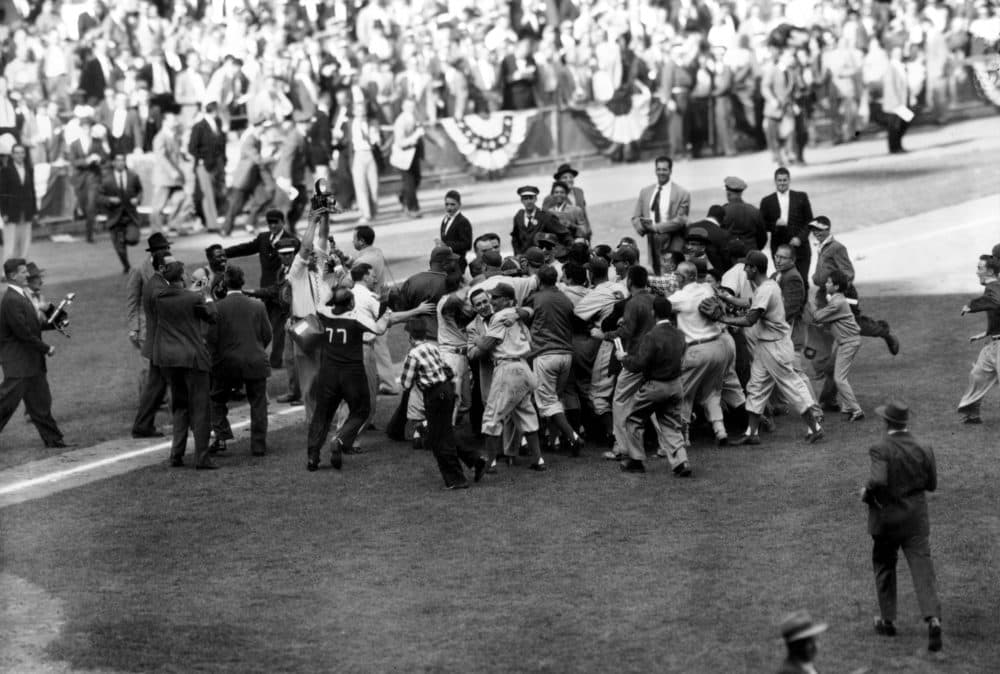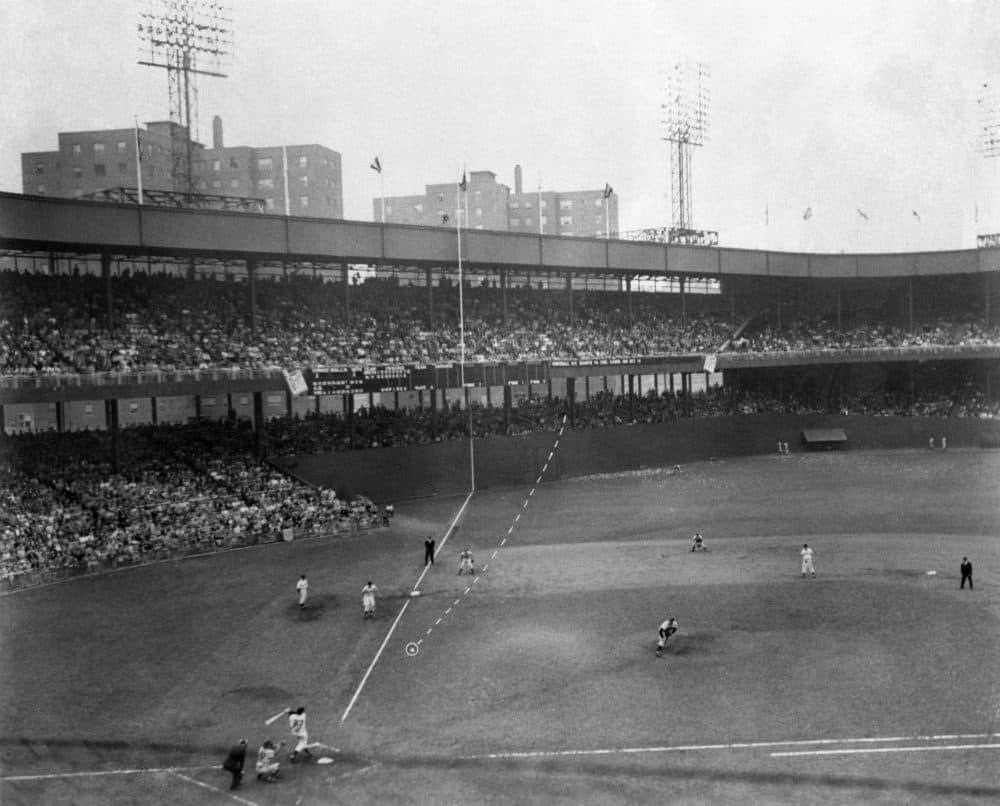Advertisement
Why Doris Kearns Goodwin Says Baseball Made Her A Better Historian
Resume
Back in March of 2017, I attended a narrative journalism conference at Boston University. The theme was "Storytelling in Turbulent Times," which looking back, makes me think we might need to re-define the word "turbulent."
In between dire warnings about the perils of reporting during the Trump presidency, one speaker stood out: Doris Kearns Goodwin. Sure, she talked about the man occupying the White House — and, as a Pulitzer Prize-winning historian whose biographies of American presidents have appeared at the top of the New York Times bestseller list, she had a lot to say. But she also spoke about baseball and how her love of the Brooklyn Dodgers made her a better historian.
As soon as I had the chance, I sent an interview request to her publicist. The publicist replied, "I know Doris would love to do this with you, but finding a time is the issue."
Well, we didn’t find the time that spring. And we didn’t find the time that fall. And, here we are, three and a half years later, and it’s Only A Game’s very last new show, and we have finally found the time.
KG: So, what is your first memory of baseball?
DKG: My first memory, really, is when I was 6 years old. And my father gave me this bright red scorebook, and he taught me the art of keeping score. I learned about a K, or a check, or getting the players around the bases. And it just made me feel like I was learning the game in a new way. And, mostly, I was learning from my father.

KG: Was baseball presented as something that was, like, just a game, or was it, like, something really important?
DKG: Oh, it was much larger than the game. My father had grown up in Brooklyn. He'd actually seen Ebbets Field being built. And for him and for so many people where we lived — I mean, we lived in Long Island. And we lived on a block where there were Giant and Yankee fans altogether. But everybody loved baseball. It was the game at the time.
And it really was more than just a game, because my father had had a really tough childhood. He had lost his parents when he was young. He was orphaned. And he had this incredible, contagious optimism despite everything. And everybody who knew him just knew when he walked in a room that there was a warmth to him. That warmth was extended to us as children, obviously. My older sisters were 10 and 15 years older than me. So when baseball became our special thing, I felt very excited.
KG: So I've heard you say that baseball made you a better historian and a better storyteller. How so?
DKG: Well, I think there's no question. So what would happen when I first was learning how to do this, and he would come home from work — I was too excited, so I'd blurt out, "the Dodgers won,"or, "the Dodgers lost," which, of course, took much of the drama of this two-hour telling away. So I finally learned that you had to tell a story from beginning to middle to end. And that became really important, because what happens with history is we know the end of the story.
Like, for example, we know that the Great Depression came to an end when we mobilized for the war. We know that World War II was won by the Allies, but the people living in the Great Depression or the early days of World War II did not know that. So you have to recreate their anxiety and their fear and their moments of triumph and the moments of tragedy. So it was really the same thing with baseball.
KG: That's amazing. Did your dad ever say to you, "Oh, just tell me who won?"
DKG: No. In fact, he already knew who won. That's what's so crazy, right? He never even told me when I was young that all of this would be in the newspapers the next day. So at first I thought he wouldn't even know what happened to the game without me.
KG: What was your happiest moment as a Brooklyn Dodgers fan?
DKG: Well, of course, there's no question: when we finally won the World Series after all those long years. And what made it so much fun is that this showed how much baseball was a part of growing up at that time in the 1950s in Long Island. There was an announcement that everybody should go into their home rooms at 1 o'clock, and the game was piped over the radio. So to be — I mean, I can still picture what it was like to be in that classroom. And then the bell rang at 3 o'clock, and everybody ran home. I mean, those were the days when you were not too far from your school.

And when I got home, I got home in time to watch the ending of the game with my mother. And I can just remember when [sportscaster] Vin Scully said, "Ladies and gentlemen, the Brooklyn Dodgers are champions of the world." It was the words you've been waiting for your whole lifetime. You know, so we jumped up and down, and it was a pretty magical day.
KG: And I'm going to bet I can guess what this moment is, too, but what is your saddest moment as a Brooklyn Dodgers fan?
DKG: I'm sure you guessed right. It was when the Dodgers lost the playoffs to the Giants in 1951. All that summer, we'd been so far ahead. So then I'm home listening to the game. And my sister Charlotte ... was there. And just at the last minute when Bobby Thomson got up, she predicted that he would get a home run. And so, she had such power I thought she made it happen. So I threw down my red scorebook and, just, it was a terrible moment.

And I ended up living in Concord, Massachusetts. And of course, the shot that Bobby Thomson hit was called "The Shot Heard Round the World." And, when I would take visitors to see the Minuteman Statue where Ralph Waldo Emerson's words are inscribed, "the shot heard round the world," meaning, of course, the shot at North Bridge that has something to do with the beginning of the [American] Revolution. And I'm thinking of Bobby Thomson. I think, "Ah, what is wrong with me? I'm not really a good historian. This is crazy that baseball is intruding into my memories."
KG: You know, I didn't predict that correctly at all, because I thought you were going to say your saddest day was when the Dodgers left Brooklyn.
DKG: Oh, wow. Well, of course. I mean, that was a different dimension of sadness. I mean, you can't imagine. I mean, some fans never went back to baseball. It was terrible. You know, they go to California — Giants go away to San Francisco — and I go to college. And baseball is not even part of my life anymore, which is a big hole to have at that moment in time.
But then I came to graduate school at Harvard, and a boyfriend took me to Fenway Park. And, you know, there it was again: that small stadium, you know, so impossibly crowded. You're sitting on top of the players. The fans are crazy, and they're yelling and screaming. And I fell in love and became a passionate Boston Red Sox fan. The fact is that the Dodgers had been my childhood love. But I actually ended up being married to the Boston Red Sox, because my husband had been a Red Sox fan. We had season tickets for 30 years.
KG: So, in 1994, you found yourself telling stories about being a baseball fan to Ken Burns for his multipart documentary. You were the only woman really featured in that. What was that experience like for you?
DKG: It actually had a large impact on my life. First, I just assumed I would be interviewed for a few minutes and then that would be it. And I remember I'd come in from California, and, you know, my hair wasn't right. I could still remember that I wasn't dressed the way I would have if I'd known, "Oh, my God. This is going to become a national documentary." But because he was focusing so much on these teams, you know, especially the Brooklyn Dodgers and the Red Sox, a lot of the interview made it into the documentary.
"To be able to bring my parents back to life after having spent so many decades bringing presidents back to life — it meant an enormous amount to me."
Doris Kearns Goodwin
And then what happened is, the same year that his series came out, I was on the trail because I'd written "No Ordinary Time," my book about Franklin and Eleanor Roosevelt. So everywhere I go, I would meet people, especially women, sometimes, who would say to me, "You know, I had a similar relationship with my father." And so somebody approached me from the publishing world to say, "Why don't you write a book about it?" And I never would have thought of writing a memoir about myself. But it was really — "Wait Till Next Year" was really about falling in love with the Brooklyn Dodgers and growing up in the 1950s.
Both my parents had died by then. My mother died when I was 15; my father when I was in my 20s. We no longer lived in that same house for a long time. So I went back home, and I found people that had been my neighbors. I found my friends who had gone to high school with. And to be able to bring my parents back to life after having spent so many decades bringing presidents back to life — it meant an enormous amount to me. And it never, ever would have happened without the Ken Burns thing.
KG: So I'm hoping you might have some lessons that we can take from baseball and maybe from history as we face what really feels like an unprecedented moment.
DKG: It truly is. And I think the hardest thing about it, as I say, is that we just don't know how it's going to end. If we knew that four months from now, there'd be a vaccine, you could get through the four months. And I think the hardest thing that we've lost during this time of not being connected is the loss of the rituals that we used to do. I mean, work and play are not separated anymore. And there was something about the rituals of the baseball season that just made you feel like you knew what was happening during the whole year.
"In this difficult time, families have to find rituals that they can share together ... that takes you away from your individual self and makes you a community again."
Doris Kearns Goodwin
I think the most underappreciated aspect of leadership, whenever I talk about leadership, is the ability to find time to relax and replenish your energies. And as I studied my presidents, I found, you know, Lincoln went to the theater a hundred times during the Civil War. He said, if I didn't do it, the anxiety would kill me. FDR had a cocktail party every night, where the rule was you couldn't talk about the war.
There's a certain sense in which, still in this difficult time, families have to find rituals that they can share together. If it's not baseball, then maybe it's something else the family does together that takes you away from your individual self and makes you a community again. But keeping the rituals going, I think, is really important. And that's one of the things baseball provided year after year after year for me.
Doris Kearns Goodwin’s memoir about growing up with the Brooklyn Dodgers is called “Wait Till Next Year.” Her most recent book is “Leadership: In Turbulent Times.”
This segment aired on August 29, 2020.
